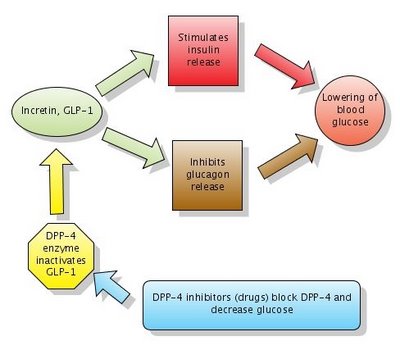There is urgent need for new treatment strategies for diabetes type 2.
Some new approaches include:
- Long acting (eg, once weekly) agonists of the glucagon-like-peptide-1 receptor - they improve prandial insulin secretion, reduce excess glucagon production, and promote satiety
- inhibitors of dipeptidyl peptidase 4 (DPP-4), which enhance the effect of endogenous incretin hormones
- inhibitors of the sodium—glucose cotransporter 2, which increase renal glucose elimination
- inhibitors of 11β-hydroxysteroid dehydrogenase 1, which reduce the glucocorticoid effects in liver and fat
- Insulin-releasing glucokinase activators and pancreatic-G-protein-coupled fatty-acid-receptor agonists, glucagon-receptor antagonists, and metabolic inhibitors of hepatic glucose output are also being assessed

Figure 1. Action of DPP-4 inhibitors. Note that DPP-4 normally inactivates GLP-1. DPP-4 inhibitors block DPP-4 which in turn leaves GLP-1 active. Click to enlarge the figure. Created with Gliffy. The diagram Action of DPP-4 inhibitors is now on Wikipedia.
References:
Management of type 2 diabetes: new and future developments in treatment. The Lancet, Volume 378, Issue 9786, Pages 182 - 197, 9 July 2011.
Comments from Google+:
Emily Lu - Question is - how many of these treatments will actually be available to minority groups that have the higher prevalence of diabetes?
Ves Dimov - Excellent question. Check this one too: "By 2030, the number of individuals with diabetes worldwide is expected to rise to half a billion (470 million) - almost 80% of whom will be in low-income and middle-income countries. In these regions, diabetes drugs and insulin are often inaccessible or are too expensive." Early diet intervention may be the answer in type 2 diabetes.
Emily Lu - "Early diet intervention may be the answer in type 2 diabetes." -- True enough, but much much easier said than done! Patient education in general seems to me to be critical as well.
Ves Dimov - Diet is difficult to implement from patient's perspective. Activity did not bring the expected benefits in the latest trial - reported in the July 2011 issue of the Lancet.
Some new approaches include:
- Long acting (eg, once weekly) agonists of the glucagon-like-peptide-1 receptor - they improve prandial insulin secretion, reduce excess glucagon production, and promote satiety
- inhibitors of dipeptidyl peptidase 4 (DPP-4), which enhance the effect of endogenous incretin hormones
- inhibitors of the sodium—glucose cotransporter 2, which increase renal glucose elimination
- inhibitors of 11β-hydroxysteroid dehydrogenase 1, which reduce the glucocorticoid effects in liver and fat
- Insulin-releasing glucokinase activators and pancreatic-G-protein-coupled fatty-acid-receptor agonists, glucagon-receptor antagonists, and metabolic inhibitors of hepatic glucose output are also being assessed

Figure 1. Action of DPP-4 inhibitors. Note that DPP-4 normally inactivates GLP-1. DPP-4 inhibitors block DPP-4 which in turn leaves GLP-1 active. Click to enlarge the figure. Created with Gliffy. The diagram Action of DPP-4 inhibitors is now on Wikipedia.
References:
Management of type 2 diabetes: new and future developments in treatment. The Lancet, Volume 378, Issue 9786, Pages 182 - 197, 9 July 2011.
Comments from Google+:
Emily Lu - Question is - how many of these treatments will actually be available to minority groups that have the higher prevalence of diabetes?
Ves Dimov - Excellent question. Check this one too: "By 2030, the number of individuals with diabetes worldwide is expected to rise to half a billion (470 million) - almost 80% of whom will be in low-income and middle-income countries. In these regions, diabetes drugs and insulin are often inaccessible or are too expensive." Early diet intervention may be the answer in type 2 diabetes.
Emily Lu - "Early diet intervention may be the answer in type 2 diabetes." -- True enough, but much much easier said than done! Patient education in general seems to me to be critical as well.
Ves Dimov - Diet is difficult to implement from patient's perspective. Activity did not bring the expected benefits in the latest trial - reported in the July 2011 issue of the Lancet.